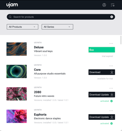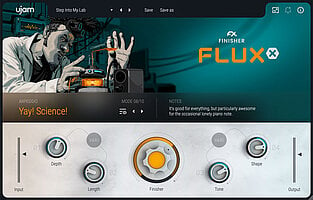What’s the Deal with Web3 & Music?
How blockchain technology and decentralization will affect creators and what this means for you in the new music industry.
DECEMBER 10TH, 2022
If you are looking to spread your music in a whole new way and add excitement to your community, this is the article for you. Find out more about the world of NFT's and get inspired for new possibilities and projects.
Where we are right now
The promise of a more secure, decentralized internet has been covered at length by countless different news outlets and there are plenty of speculations about what it will mean for society at large — the basic theory behind Web3 is that more power will be transferred away from big tech companies and into the hands of everyday users, with greater data privacy and security. Rather than online data being concentrated in the possession of large platforms, it can be stored across multiple different locations rather than in one or few; hence, decentralized. This has powerful implications regarding true ownership for content creators, but the aspect of this that often gets more buzz is another use of blockchain technology: cryptocurrency and non-fungible tokens, or NFTs.
An increasingly popular example is selling concert tickets as NFTs, which allows for far greater utility than simply allowing admission at the door. NFTs make it possible for artists to add downloadable content and other means of access for fans, all which can be time-locked to open at just the right moment. This may even include perks like new releases prior to their appearance on streaming sites, allowing artists to create a “VIP” experience for their fans that wouldn’t otherwise be possible. All manner of digital goods can be sold as NFTs, and a single NFT can actually comprise many different types of products at once — tickets, music, artwork, and countless other forms of entertainment can even have value beyond the initial sale.
Building something that lasts
For example: One of the most interesting opportunities for artists who create original music is the possibility of additional means of collecting royalties. Traditionally, royalties have had two main forms: mechanical and performance royalties, which have to do with the recreation, sale, and public use of songs, amongst many other specific cases. This is how streaming income, digital music music sales, etc. are paid out to artists when they’re not directly involved in the transaction, and they’re collected and distributed to artists by Performing Rights Organizations, or PROs. If you belong to a PRO and your music is being consumed, they will work on your behalf to ensure you’re paid the legal rates for your work.
NFTs add an entirely new dimension to this, however — if you sell an album as an NFT, it can be coded such that a portion of any resales goes back to you as the creator. And because NFTs constitute ownership, there’s measurable value to any fans who buy your work and can resell it later. Some NFTs even allow users to earn a portion of the music’s streaming royalties, allowing fans to benefit when their favorite artists make it big. There’s a ton of potential for a deeper connection between creators and fans, and it’s certainly worth looking into if you want to bring fans on the journey with you.
Launching your first NFT project
If you’re interested in starting an NFT project, the first step is to develop a general idea of what you want to offer fans and your overall intent in launching it. It’s much simpler (and often less expensive) to release an album on Bandcamp, for example, than it is to create an NFT of an album and distribute it. If it doesn’t need to be an NFT, it’s likely not worth the energy to go that route. However, if the opportunities for resale and ownership are central to your plan, then NFTs may provide you with an excellent opportunity.
The next step then is to research different companies that will create an NFT for you and analyze the costs along with, most importantly, the trustworthiness of each option. There’s no end to the number of pop-up companies promising to help “NFT your music”, so it’s important to make sure you choose the right service. From there, you’ll upload your digital assets — audio files, videos, animations, gifs, images, whichever formats you envision for the final product — and the company will create an NFT for you to sell to your fans. You can find more info in this article from Production Music Live!
Upsides vs. risks
Because NFTs exist on the blockchain, all sales are tracked and secure; when fans buy these NFTs, they receive unique digital ownership of their purchase, unlike how a standard audio file can be duplicated infinitely. This is where the true value of NFTs comes from, as it gives fans a sense of ownership in their journey with you. And if they’re able to resell their purchases later, they can directly benefit from supporting you (and you can earn additional royalties on your music)!
A decentralized blockchain environment has its downsides too, of course — a big one being their valuation. Cryptocurrency valuations are prone to volatility, and they are intricately tied to NFTs. Even as your artist image grows, it’s possible for the value of your NFTs to dip due to factors entirely outside of your control. By creating an NFT, you’re betting on the future success of the cryptocurrency it runs on, which at the time of writing is typically Ethereum. The blockchain also requires power to maintain, meaning computational resources are required to maintain it for its entire lifetime; this isn’t necessarily a bad thing, but you definitely should take all this into consideration before launching your project; if you go into it with intentionality though, there are tons of opportunities to grow a successful music career using NFTs!
Wrapping up
The NFT landscape is constantly changing, and there are tons of exciting opportunities constantly emerging for musicians and music producers everywhere. However, you’ll likely fare much better if you use them as a tool to help fans share in your music career, rather than strictly as a monetization tool.
If your focus is on creating an amazing journey and bringing people along for the ride, it will be much easier to create a loyal fanbase that sticks with you all the way through. Make sure you trust the services you choose to create the NFTs and do your due diligence, and from there, focus on creating an amazing experience for your followers. Good luck!
About the Author
Harry Lodes is a copywriter, marketing consultant and content writer for audio and ecommerce brands. He lives in the Philadelphia area, releasing Eastern/Western hybrid EDM under the artist name KAIRI hearkening back to his roots in Berklee College of Music.
Stay up to date
Sign up and we’ll send you an e-mail with product news and helpful stuff every now and then. You may unsubscribe at any time.
Defy Limits
We develop software solutions that enable people to create, consume and interact with music.

